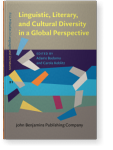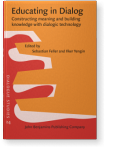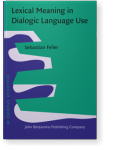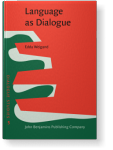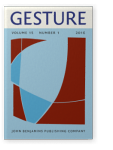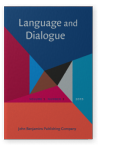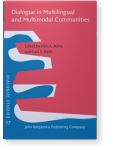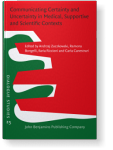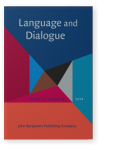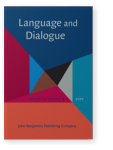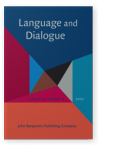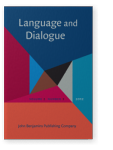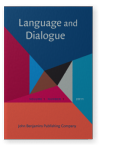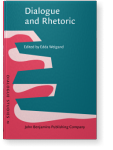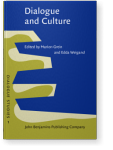Sebastian Feller
List of John Benjamins publications for which Sebastian Feller plays a role.
Book series
Titles
Educating in Dialog: Constructing meaning and building knowledge with dialogic technology
Edited by Sebastian Feller and Ilker Yengin
[Dialogue Studies, 24] 2014. xviii, 250 pp.
Subjects Communication Studies | Dialogue studies | Pragmatics
Subjects Dialogue studies | Discourse studies | Pragmatics | Semantics
Language as Dialogue: From rules to principles of probability
Edda Weigand
[Dialogue Studies, 5] 2009. viii, 410 pp.
Subjects Communication Studies | Dialogue studies | Discourse studies | Philosophy | Pragmatics
2016 Obligatory processing of irrelevant gesture Gesture 15:1, pp. 60–78 | Article
This paper presents a study of selected iconic gestures with a view to determining their effects on RT in a task-relevant and a task-irrelevant context. In two experiments, participants were presented with a coloured shape on a computer screen, a spoken statement referring to the presented shape,… read more
2015 Review of Ginzburg (2012): The Interactive Stance Language and Dialogue 5:3, pp. 485–489 | Review
2015 Dialogic knowledge building in learning communities: Discovering an electric circuit through collaborative learning Dialogue in Multilingual and Multimodal Communities, Koike, Dale and Carl S. Blyth (eds.), pp. 195–219 | Article
In modern education, there has been an increasing emphasis on creative thinking, collaborative problem-solving and critical discussion. In this chapter, I argue that learning communities foster these skills and thus provide a strong foundation for deep learning; i.e. learning that is based on deep… read more
2015 Preface Language and Dialogue 5:3, pp. 353–354 | Article
2014 Teaching and learning as explorative action games. Guidelines for the design of dialogic educational technology Educating in Dialog: Constructing meaning and building knowledge with dialogic technology, Feller, Sebastian and Ilker Yengin (eds.), pp. 223–239 | Article
In this paper, I develop a view of teaching and learning as explorative action
games (TaLEAG). The concept of the action game is borrowed from Weigand’s
(2010) Theory of Dialogic Action Games or Mixed Game Model (MGM). The
MGM rests on two basic assumptions: communication is dialogic and… read more
2014 Uncertainty as integrated part of meaning and understanding Communicating Certainty and Uncertainty in Medical, Supportive and Scientific Contexts, Zuczkowski, Andrzej, Ramona Bongelli, Ilaria Riccioni and Carla Canestrari (eds.), pp. 99–114 | Article
In this chapter, we discuss the issue of uncertainty in language and communication. The starting point for the discussion is Weigand’s (2010) Mixed Game Model, a theory of dialogic language use. Feller’s (2010) meaning-in-use, which conceptualizes meaning construction as a dialogic process, puts… read more
2014 The good, the bad, and the ugly: The co-construction of identities in dialog Language and Dialogue 4:3, pp. 341–356 | Article
In this paper, I will present a dialogic view of identity. I argue that identity is not a static description of who or what a person or thing is rather than the outcome of, what I call, a dialog of cultures. In a broad sense, identities are negotiated or, co-constructed, against the background of… read more
2013 Preface Language and Dialogue 3:3, pp. 339–340 | Article
2012 Recent developments in HCI: Implementing cultural models in human–computer interaction Language and Dialogue 2:3, pp. 465–478 | Article
In this article I critically discuss four studies in the area of Human–Computer Interaction (HCI) research. The focus is on distinct dimensions of culture including both verbal and para-verbal behavior in communication. My discussion is grounded in Weigand’s (2010) theory of dialogic action games… read more
2011 Language use and the lexicon Language and Dialogue 1:1, pp. 129–145 | Article
In this article I critically discuss two state-of-the-art theories of meaning in Cognitive Semantics: Evans’ (2006, 2009) LCCM-Theory and Jackendoff’s (2010a, 2010b) Parallel Architecture. The main focus will be on how these theories define meaning and how they represent it. This will serve as a… read more
2009 A look beyond Language as Dialogue: From rules to principles of probability, Weigand, Edda, pp. 379–380 | Article
2009 Introduction to Part II Language as Dialogue: From rules to principles of probability, Weigand, Edda, pp. 147–148 | Article
2009 Introduction: In the tide of change Language as Dialogue: From rules to principles of probability, Weigand, Edda, pp. 5–12 | Miscellaneous
2009 Introduction to Part I Language as Dialogue: From rules to principles of probability, Weigand, Edda, pp. 19–20 | Article
2009 Introduction to Part III Language as Dialogue: From rules to principles of probability, Weigand, Edda, pp. 261–264 | Article
2009 Preface Language as Dialogue: From rules to principles of probability, Weigand, Edda, pp. 1–4 | Preface
2008 Irony as a rhetorical device in dialogic interaction Dialogue and Rhetoric, Weigand, Edda (ed.), pp. 171–183 | Article
In the present article I will critically discuss various approaches to irony originating from different disciplines. Besides traditional definitions of ironic speech dating back to Roman times as well as present-day linguistic models, I will also deal with irony from a psychological perspective. As… read more
2007 Cultural differences in the speech act of greeting Dialogue and Culture, Grein, Marion and Edda Weigand (eds.), pp. 177–190 | Article
